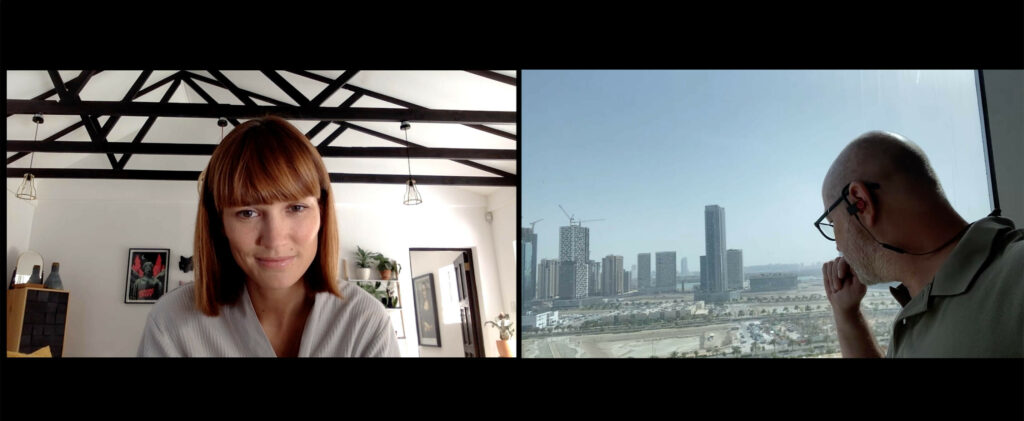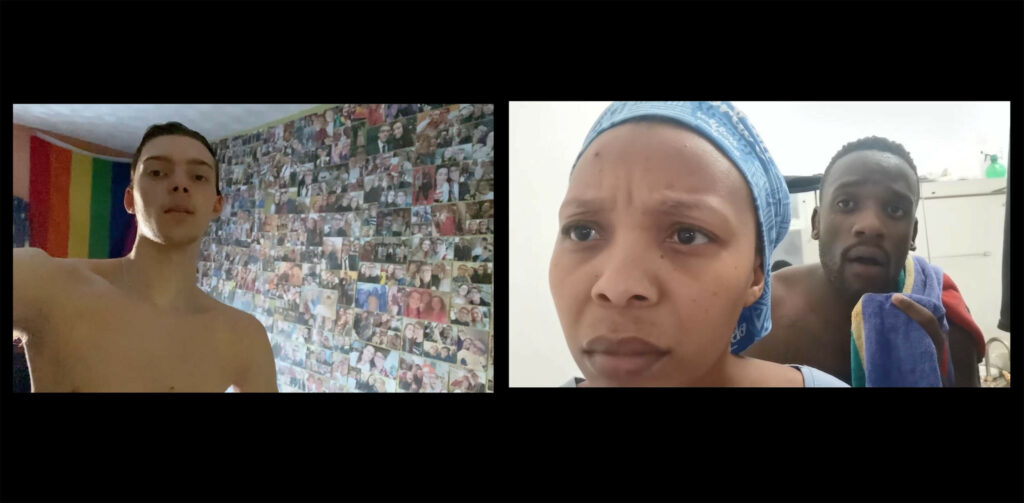Filmmaker Tim Greene launched an online campaign that led to the making of Cabin Fever during the first weeks of lockdown earlier this year. (Ter Hollmann)
Written, directed and produced by Tim Greene during the hard lockdown earlier this year, Cabin Fever is a no-budget triumph for the actors involved, for whom the film was a way of remaining creative while in isolation. Distributed by Video Vision, the film debuts on DStv Box Office on August 5. Greene spoke to the Mail & Guardian about the process of putting the movie together.
Kwanele Sosibo: What sort of skills did you have to pick up in the process of making the film?
Tim Greene: Except acting, I’ve literally done everything that there is to do. I’m the writer, the director, the producer, the editor — and now I’m the publicist. That was actually quite a steep learning curve, because the editing software I used to use has gone out of date. So I had to learn Premiere Pro.
Over the past 30 years of being in the industry, I have done so many jobs. I started off as a runner, and worked as a casting director, as a production manager, a location scout, and then started directing and writing stuff. So I feel very confident in all the various departments except for the camera department, because it’s something I’ve never worked in. But luckily, I didn’t have very much to do with that, because I had this amazing cast who would go off and shoot this thing entirely by themselves.
All the actors and I would get together on Zoom, and we’d do a read through of a particular scene, and then I’d give them pointers. In terms of camera, I might say like, “Okay, so at that point, just let it drift off you, put it down on the table, walk away so that you were in a close up and now you’re in a wide shot.” Then we’d hang up that Zoom call and I’d just wait for the files to arrive on WhatsApp.
Nine times out of 10 I was super impressed with the camera work. These guys were in character while they were watching themselves on the screen of their cellphones; while they were having to think about what had to be in the background, where the light was and so on. It was an amazing, incredibly intensive process.
 Jenna Upton and James Cunningham improvised the camera angles that gave Cabin Fever its low-budget, cinematic flair. (Supplied)
Jenna Upton and James Cunningham improvised the camera angles that gave Cabin Fever its low-budget, cinematic flair. (Supplied)
Were any of the actors already good at handling a camera?
We’ve all become good at handling a camera because everybody’s got a camera in their hands all the time these days. I don’t think any of them had any experience in shooting film. But if you think about James Cunningham in the apartment in Abu Dhabi, playing Andrew, there’s a scene where Jenna [Upton] is phoning him to say they’re going to repossess the house and he’s totally off on another tangent, about a hashtag code that he’s found. And he just lets the camera drift off him, so he’s just in the right-hand corner of the screen.
It’s like his mind is wandering and he is just slowly letting the camera do some wandering as well. But without looking. He never glances down on the screen. He can’t see what he’s doing at that moment. He’s just trusting his instincts and his instincts were just spot on there.
How much time did you have to finish this film?
We did it all in like 30 days or something. At the same time, [I was] looking after two kids and doing housework. I’d get up at 4.30 in the morning to go and edit because that was the only quiet time in the house. It was such a creative and exhilarating time. I’d only written three scenes. We shot them and then I was like: So what happens now?
I had a vague sort of roadmap in my head. But really I was just writing on the fly. I’d write late at night, and I get up early and edit and then send it to the cast. We’d rehearse it that morning, shoot it that evening or whatever. There were no producers. There were no script editors or commissioning editors. I had to completely trust my instincts. There was no second draft…
We didn’t have any logistics of trucks and toilets and camera equipment and, you know, all that stuff that bogs down a film production. Even though it was super hi-tech, in a way it also felt low-tech, like an old-school theatre company. Just the director and the actors doing their thing.
How did you settle on a way to present this kind of virtual world where the action takes place?
I thought, let’s take the Zoom aesthetic that everybody knows so well and use that as a sort of kickoff point. But I didn’t follow it too slavishly. I took a lot of liberties with how I did the layout of the imagery. I sort of wanted to have the feel of a Zoom call without actually being exactly like a Zoom call.
The other thing was, I wanted it to feel filmic. It was so important to me that it was a feature film and not some novelty short film, a little webisode or something. Aesthetically, I wanted it to have cinematic value, even though we couldn’t leave the room. The scope of it was tiny in a way, but I wanted the imagery to feel significant.
You say the look and feel came together almost by chance. How so?
When you cast an actor in this thing, you are also casting their house and their garden and whatever they have at hand in terms of props. Selecting those people was such an interesting process because everybody comes with their own thing. So you’d have to look into the background and say, “What is your view out of this window? Can you get such and such a thing?” It dictated the story in so many ways.
I asked all the actors to put up an introduction video on Facebook. In the intro video by Jenna, who plays Sarah, she walked past this painting of a ballerina that she was working on. And she mentioned that “There’s this painting that I hope to finish before the end of lockdown.” And I was like, “Oh, okay. So let’s say Ndoni [Khanyile, who plays Londi]] is the gallerist and, because of Covid-19, she’s trying to do an online gallery thing with her husband.” That whole part of the story all started with Jenna walking past her painting on the easel. It was a very free-flow type of working.
 Tem Muller, Lesego Chabedi and Bonko Khoza in a scene in Cabin Fever (Supplied)
Tem Muller, Lesego Chabedi and Bonko Khoza in a scene in Cabin Fever (Supplied)
With an uncertain future ahead, what does this film represent to you creatively?
I think a lot of it is about trusting myself. A lot of it is about soldiering on. I was freaking out: Remember, [the initial] lockdown was just 21 days, right? And I was really scared that we were going to run out of time; that people were going to go back to their normal lives and sort of lose interest in the project, because it’s an amazing opportunity to have a dozen actors who you can call up at any time and they’re not doing anything. I was very apprehensive as we were approaching the end of the second week, but then [president] Cyril [Ramaphosa] extended it for two more weeks.
As a filmmaker, you’ve got a lot of people who want to tell you what to do. The process, necessarily, has a dozen producers who all have an opinion about what you’ve written — commissioning editors in TV land, clients in advertising land. As a writer and a director you’re at the centre of a lot of opinions and it’s not always a comfortable place to be.
Do you foresee this having an effect on your process in the near future?
I think it will. Interestingly, the next feature film I’m doing is called The Theory. I wrote it last year when I had a lot of time on my hands. I had just moved back to Cape Town and was back to being freelance and I was like, “Oh my God, there’s so much in between time in between jobs.” I thought: “Can I write a film all set in one room and one night with three characters and still make it completely compelling?”
So, I wrote this story about a girl whose sister was raped and died by suicide a decade ago. She finds the guy who she thinks is responsible for it, invites him over, and ties him up and puts on a show trial on social media and gets people to judge him. But they have to ask questions and they have to participate. I was like, if I only have three characters in this film, I can have 20 more characters Skyping in, sort of thing. I had no idea when I was writing this that I was gonna become an expert on phoning in performances. So in that sense, Cabin Fever is gonna have a direct impact on my next project.